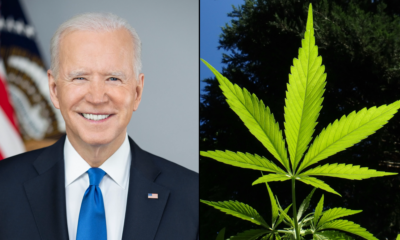Politics
California Officials Award $12 Million In Local Marijuana Equity Grants To Repair Drug War Harms

California officials have awarded $12 million in marijuana tax-funded grants to cities across the state to support equity programs for people disproportionately impacted by the war on drugs.
This is the latest round of funds that the Governor’s Office of Business and Economic Development (GO-Biz) is providing under its Cannabis Equity Grants Program for Local Jurisdictions.
The purpose of the program is “to advance economic justice for populations and communities impacted by cannabis prohibition and the War on Drugs by providing support to local jurisdictions as they promote equity in California and eliminate barriers to enter the newly regulated cannabis industry for equity program applicants and licensees,” a description says.
Localities with plans to develop or maintain cannabis equity programs were eligible to apply for the grants. GO-Biz announced last week that it is distributing $12 million across 10 cities and counties for the 2023-2024 period.
Money from the program funds local programs offering technical support, regulatory compliance and assistance with securing startup capital to equity applicants and licensees.
Here’s where the cannabis equity grants were awarded:
- City of Oakland: $3,000,000.00
- City and County of San Francisco: $2,041,520.62
- County of Trinity: $1,812,729.52
- County of Mendocino: $1,803,929.86
- City of Sacramento: $1,250,000.00
- City of San Jose: $1,026,820.00
- County of Humboldt: $600,000.00
- City of Coachella: $350,000.00
- City of Daly City: $75,000.00
- City of Santa Monica: $40,000.00
The San Jose City Council announced on Tuesday that members voted to accept its share of the funds that will assist graduates of the city’s Cannabis Equity Business Academy “through grants for their business’s startup and ongoing costs, including obtaining legal and regulatory assistance.”
Will Koch, deputy director of community and local equity grants at GO-Biz, said the office is “thrilled to support the City of San José’s efforts to reduce barriers to entry into the legal, regulated cannabis industry.”
“We look forward to this grant providing the technical assistance and funding to support equity in licensing and cannabis business registrations,” he said.
Nanci Klein, director of the San Jose Office of Economic Development and Cultural Affairs, said her agency is “committed to driving a competitive economy that increases the prosperity and quality of life for all our residents and business owners.”
“The Cannabis Equity Business Academy seeks to equalize the playing field in this complex and heavily regulated business sector, and I am glad to say that of the 29 San José residents participating in the Academy, 86 percent of them identify as Asian, African and Native American, Latino or Pacific Islander,” she said.
Grants under the GO-Biz program for last fiscal year went to 16 cities and counties across the state, ranging from $350,000 for San Diego County to nearly $2 million for Oakland.
The office noted that the governor’s recently unveiled budget proposal calls for another $15 million in funding for the program, “and we intend to issue our next grant solicitation in October 2024.”
Gov. Gavin Newsom (D) said in his budget request that he will continue working to “strengthen” the state’s marijuana market, but he also proposed to help close an overall government budgetary deficit by borrowing $100 million from a cannabis tax fund designated for law enforcement and other public safety initiatives.
—
Marijuana Moment is tracking more than 1,400 cannabis, psychedelics and drug policy bills in state legislatures and Congress this year. Patreon supporters pledging at least $25/month get access to our interactive maps, charts and hearing calendar so they don’t miss any developments.
![]()
Learn more about our marijuana bill tracker and become a supporter on Patreon to get access.
—
Separately, the state Department of Cannabis Control (DCC) announced last September that the office was doubling the amount of money available to localities to speed the opening cannabis retailers in their jurisdictions—part of a different grant program that aims to mitigate the illicit market.
Last month, DCC also rolled out a new marijuana database that’s meant to help consumers, stakeholders and lawmakers better understand industry trends—including monthly sales data and information about cannabis licensees.
A recent poll commissioned by DCC found that 62 percent of adults believe the state’s legalization law is having a “positive” impact—an even greater percentage than actually voted to enact the reform on the ballot a little more than seven years ago.
Kansas Senators Kill Bill To Create Medical Marijuana Pilot Program
















